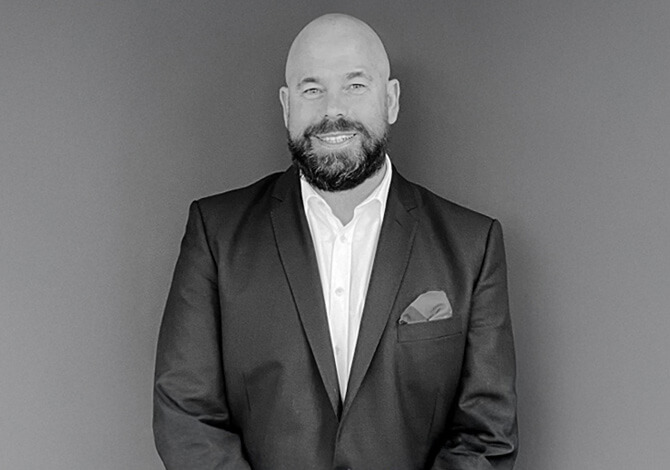In conversation with: Barry Matthews, Pennon Group
Social mobility is a crucial topic today because it allows our workforce to be more diverse by incorporating talent from all backgrounds and providing equal opportunities. In this interview we talk to Barry Matthews, Group Deputy General Counsel at Pennon Group, about his passion for social mobility, his own story and how others can embed social values into their own working lives. Barry also sits on the Board of the Solicitors Regulation Authority and founded the Employer’s Social Mobility Alliance (ESMA).


Thanks for speaking to us today Barry. We’ve spoken before about your commitment to social mobility. It clearly matters to you. Why is that?
Social mobility’s important to me because it is me. At 17, I told my careers advisor that I wanted to go to university and study law. The inspirational words I got back were “People like you don’t go to university and study law. You’ll probably see the inside of a prison cell, but that’s the closest you’ll get to the law”. That put fire in my belly. I went off to Durham and studied law. And 30 years later, here I am.
I understand the barriers people put up in their own minds to entering professions like law. It feels so out of reach because you don’t have a network to help you understand the pathway. I’ll always remember sitting in the library revising for second year exams and hearing talk about vacation placements. I asked, “What’s a vacation placement”? It’s only because of that chance conversation that I ended up applying to Lovell White Durrant (Hogan Lovells) and then got a training contract off the back of the placement.
You don’t know what you don’t know. You can meet challenges that are put in front of you, but if you don’t know what you need to do, it’s impossible. I made a lot of mistakes on my own journey. I’d like to make the route easier for others like me coming through now.
And where do you think we are today? How do you view the state of social mobility in the legal profession?
I think the profession has made real strides. Look at initiatives like the PRIME commitment created by A&O’s David Morley, challenging law firms to think differently about getting people through the door, and the Social Mobility Business Partnership (SMBP), which I co-founded and which now works with 1,000 students from all corners of the UK facilitating work experience, resilience training through the lens of professional sport and lifetime career coaching. SMBP started with GCs and law firms coming together to provide work experience, but now it covers all kinds of roles across the UK business community.
The SRA has done great work through mandatory socio-economic diversity reporting and the introduction of the Solicitor Apprenticeship standard. The Solicitor Apprenticeship has been widely adopted across private practice and the in-house community alike. We now have a five-strong apprenticeship scheme at Pennon Group PLC.
Former Lord Mayor of London, Vincent Keaveny – a DLA partner – made social mobility a focus of his tenure, emphasising progression over just entry-level access to the professions. And while I think you know that I don’t necessarily agree with the Social Mobility Index, because it doesn’t reward collaboration or supporting smaller less well-resourced organisations building social mobility into their talent programmes, there are a number of law firms ranking really highly.
Never rest on your laurels, but I think we’re doing good things.
My next question was going to be about the specific barriers to entry you still see in the profession. But you’ve made me think there, it’s not just about entry, is it? Once you’ve got yourself through the door, what barriers still exist in terms of progression?
You’re absolutely right. We should ask ourselves more broadly, what are the barriers to somebody achieving their ambition?
Access is essential, of course, and we all need to do that outreach and make sure we’re demystifying the law. I don’t just mean becoming a lawyer. Half the workforce in a law firm aren’t lawyers. As part of some SMBP clusters, we help facilitate work insight days with law firms to show all the careers that exist within that firm.
Once you’re in, there’s a huge amount to be said around mentoring. The biggest point of your transition as a lawyer is at the end of your period of qualifying work experience (training contract in old money). During those 24 months everything’s structured for you. Too many firms don’t have proper conversations with NQs about their long-term career goals and provide support beyond their training period to attain them. The key question being do they want to become a subject matter expert or go into management/people leadership roles?
That’s true for everyone, but for individuals from underrepresented backgrounds, targeted mentorship is crucial since they may not have family networks to guide them. I think about the support I can give to my kids versus what my mum and dad could give to me. Whatever my kids choose to do, I’ll know somebody who does that and I can set up a call. I can give them tools that I never had.
And presumably those mentors don’t just have to be within a law firm. We, as a firm, can reach out to clients to say “What can we do together?”.
Exactly. It’s mutually beneficial. This isn’t just about social responsibility; it’s about building the next generation of talent. Reaching out to clients to exchange mentors strengthens those relationships and ultimately benefits everyone.
How do you manage to incorporate your commitment to this and your passion for this into your role? How have you managed to bring it into what must be a really busy day job?
By being clear about it upfront. When I go for a job, I make sure I can pursue my passion and commitments as part of my day.
I’ve got an extraordinarily supportive boss in Andrew Garard. Helpfully, he co-founded the SMBP with me. More generally it’s important in teams to know what people’s interests are, so you can support them. Flexible working isn’t for just for those with caring responsibilities. When people feel supported to do the things they care about, they become more engaged. What are more engaged people? They’re more productive people. What do more productive people drive? A more profitable business. It’s therefore in the interests of the business to enable employees to pursue their CSR passions.
So what advice would you give to other GCs – other leaders – who want to embed their own social values, whether that’s social mobility or otherwise, into their working lives?
Start by ensuring you have your manager’s support. Have an honest conversation about what drives you and how that adds value to your role. I don’t have a hobby; I run a charity. It’s part of who I am, and I need that purpose to stay engaged and productive.
Put together a business case for why inclusion – not just diversity – is important. You can have a visibly diverse team, but if everyone has the same background – they’ve all been to the same school, or the same university – you lack cognitive diversity. A genuinely inclusive culture supports and educates people about different life experiences. For instance, we’ve introduced menopause awareness sessions for male managers, which is part of a bigger effort to build empathy and understanding.
If you’re serious about having a productive and efficient organisation, you need to fish in a talent pool, not a talent puddle. To do that, you need to show to individuals from any background, with any characteristic, that your organisation accepts them for who they are, so long as they work hard and are collaborative. If you get that message to the outside world, you’ll get the best people coming – and, funnily enough, they’ll also stay.
OK, so my last question. Looking ahead, what more do you think we – whether that’s the legal profession, the corporate world, whether that’s society as a whole – what more can we be doing? What’s next?
There’s a project I started just before lockdown with two partners from PWC, Andy Boucher and Barry Murphy, and it’s kind of stalled. We created a concept called the Employers Social Mobility Alliance (ESMA).
ESMA looked at all life stages, from early years all the way through to retirement, and ask “What’s inhibiting people from meeting their potential from a social background perspective?”. We worked with Nick Miller from the Bridge Group to create these pithy Executive Summaries which signposted out to the underlying research, so you could get your arms around the issues without having to know where the research was located. We then planned to create a heat map of the UK that highlighted existing initiatives to tackle the issues to encourage businesses to collaborate rather than reinvent the wheel.
I’d love to pick that up again. It would really shift the dial on promoting collaboration. We should be confident and comfortable enough in our own brands that we aren’t afraid of working together. That’s why I’m so passionate about SMBP. We never refer to the students as “our students”. They’re individuals. We’re one intervention of many they need to fulfil their potential. And the more we can support people to get out there into the talent pool, the more we all benefit. As people say, a rising tide lifts all boats.
So, to answer the question, we should be encouraging more collaboration and less competition.
I think that’s a great note to end on. Thanks so much for that Barry. We’re looking forward to what you do next.
“If you’re serious about having a productive and efficient organisation, you need to fish in a talent pool, not a talent puddle. To do that, you need to show to individuals from any background, with any characteristic, that your organisation accepts them for who they are, so long as they work hard and are collaborative.”